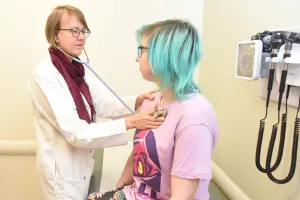Crohn’s disease and ulcerative colitis are both part of inflammatory bowel disease (IBD) and cause chronic inflammation of the digestive tract. However, they are different conditions with distinct treatments.
What is the difference between irritable bowel syndrome (IBS) and inflammatory bowel disease (IBD)?
Both are disorders that irritate your digestive tract and can cause pain, discomfort, inflammation, bleeding and ulcers. IBS does not cause damage to your digestive tract and can often be treated with medication and lifestyle changes. Crohn’s disease and ulcerative colitis (also known as IBD) are lifelong illnesses that damage your digestive tract – but the good news is that they can be managed through medication or surgery. We’ll work with you and your gastroenterologist to elevate pain and symptoms to help you return to what you love.

Conditions
IBD consists of Crohn's disease and ulcerative colitis. Both cause chronic inflammation of the gastrointestinal (GI) tract. While the exact cause is unknown, IBD is the result of a weakened immune system and is typically treated by medication and surgery.
Crohn's disease is an autoimmune disease that can irritate any part of your digestive tract (large and small intestine). There are 5 different types, depending on where in the digestive tract the disease affects.
The cause of Crohn's disease is unknown, and while stress and eating certain foods don't cause Crohn's, both can worsen symptoms. Symptoms may flare up at times, while at other times, you may have mild to no symptoms at all. When symptoms flare, they may include:
- Abscesses
- Cramping and abdominal pain
- Diarrhea
- Eye redness or pain
- Fatigue
- Fever
- Fistulas
- Intestinal obstruction
- Joint pain
- Joint soreness
- Loss of appetite
- Nausea
- Weight loss
Ulcerative colitis is an autoimmune disease where the body mistakenly thinks you have an infection and begins attacking healthy tissue instead of protecting it. In the case of ulcerative colitis, this response can result in inflammation and sores in your large intestine (colon and anus).
Symptoms of ulcerative colitis vary depending on the location and amount of inflammation in your body, may include:
- Abdominal pain and cramping
- Diarrhea, often with blood or pus
- Fatigue
- Fever
- Rectal bleeding and pain
- Urgency or inability to have a bowel movement
- Weight loss
Testing
We need to evaluate the health of your GI tract to determine the location and cause of your symptoms. Once we know more, we can diagnose and treat you. Tests may include:
- Blood tests
- Colonoscopy
- CT scan
- Contrast radiography
- Endoscopy
- MRI
- Sigmoidoscopy
- Stool samples
Treatments
Typically, treatment for IBD starts with medication to reduce inflammation. For some people, medications control and eliminate symptoms for months to years. Symptoms may change or worsen for others, and your doctor may recommend surgery. The goal is to get and keep you in remission so you can do the things you love without discomfort and pain.
Sometimes, surgery is the best option to treat or help with symptoms. We will recommend the best surgery choice based on your symptoms, type of disease and location. Our surgeons will help you decide the best path for you, which may include:
- Abscess drainage
- Colectomy
- Emergency for blockage, perforation (hole in intestine), or toxic megacolon
- Fistula removal
- Large bowel resection
- Ostomy surgery
- Proctocolectomy
- Small bowel resection
- Strictureplasty
You may be able to manage and even prevent symptoms by working with your primary care doctor or gastroenterologist and regularly taking medications, changing eating habits and quitting smoking. We can refer you to one of our registered dietitians for nutritional support. Medications we may recommend for you, include:
- Aminosalicylates
- Antibiotics
- Antidiarrheal medication
- Biologics
- Corticosteroids
- Immunomodulators
- Nonsteroidal anti-inflammatory drugs (NSAIDs)
- Vitamins + supplements (like probiotics)
You may be a good fit for a clinical trial. Ask your doctor if you meet the criteria for any exciting trials. Participation in clinical trials is voluntary, so if it’s not where your comfort lies, just let us know.

From regular office visits to inpatient stays, find the healthcare you need and deserve close to home.

Meet the doctors and care team devoted to supporting you every step of the way along your path to better health.